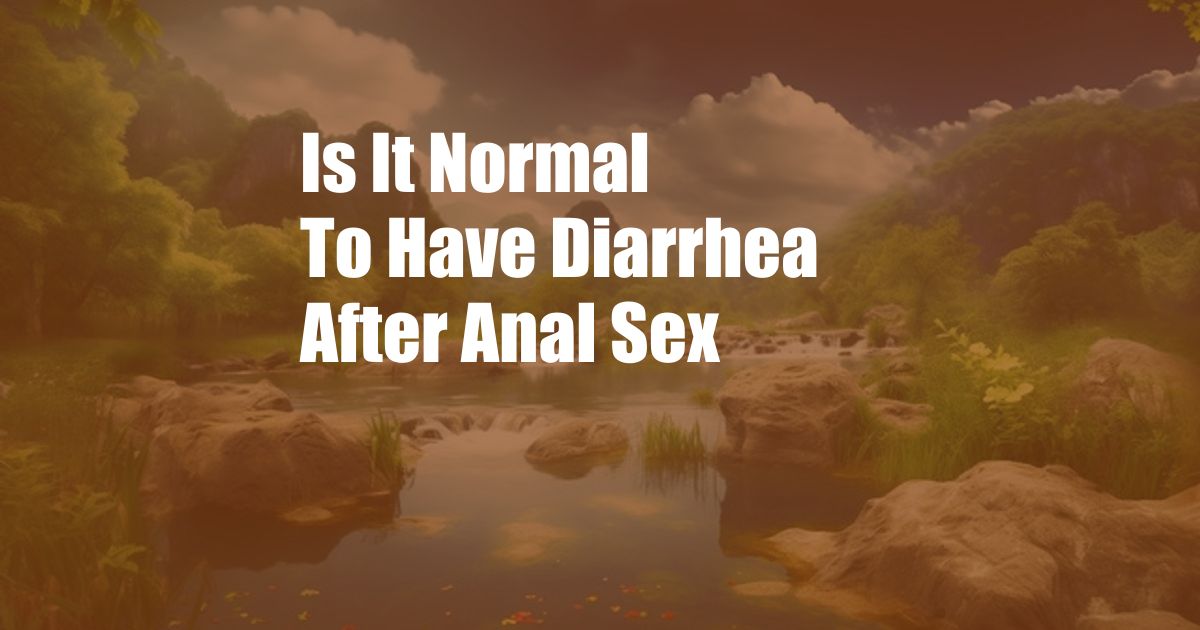
Is It Normal to Have Diarrhea After Anal Sex?
Intimate experiences can evoke a range of physical reactions, and anal intercourse is no exception. While many individuals engage in anal sex without experiencing any adverse effects, some may encounter unexpected consequences, such as diarrhea. This article delves into the potential causes of diarrhea following anal sex, exploring both common and less frequent triggers.
Potential Causes of Diarrhea After Anal Sex
The delicate nature of the anal region makes it susceptible to irritation and inflammation during anal intercourse. This irritation can disrupt the normal functioning of the digestive system, leading to loose or watery stools. The following factors contribute to this phenomenon:
-
Mechanical irritation: The insertion of a penis or sex toy into the anus can cause mechanical irritation to the sensitive tissues lining the rectum. This irritation triggers the release of prostaglandins, hormones that stimulate intestinal contractions, resulting in the expulsion of stool.
-
Inflammatory response: Anal sex can induce an inflammatory response in the anal mucosa, characterized by swelling, redness, and pain. This inflammation disrupts the normal absorption of water in the colon, leading to watery stools.
What to Do If You Experience Diarrhea After Anal Sex
If you experience diarrhea after anal sex, there are several steps you can take to alleviate symptoms and prevent complications:
-
Stay hydrated: Diarrhea can lead to dehydration, so it’s crucial to replenish lost fluids by drinking plenty of water, electrolyte solutions, or clear broths.
-
Avoid caffeine and alcohol: These substances can worsen dehydration and irritate the digestive tract.
-
Eat a bland diet: Avoid spicy, fatty, or sugary foods, as they can further irritate the digestive system. Opt for bland foods such as rice, bananas, and oatmeal.
-
See a doctor if necessary: If diarrhea persists for more than a few days or is accompanied by other symptoms, such as fever, abdominal pain, or bloody stools, consult a healthcare professional promptly.
Expert Advice on Preventing Diarrhea After Anal Sex
To minimize the risk of diarrhea after anal sex, follow these tips recommended by healthcare professionals:
-
Use plenty of lubrication: Adequate lubrication reduces friction and irritation during anal intercourse.
-
Go slowly and communicate with your partner: Gradual penetration and clear communication with your partner ensure a comfortable experience and reduce the risk of injury.
-
Cleanse thoroughly before and after: Proper hygiene helps prevent the spread of bacteria that can cause infection.
-
Consider using condoms or dental dams: Barrier methods reduce the risk of sexually transmitted infections and protect against anal tears.
-
Avoid anal sex if you have any existing anal conditions: Individuals with hemorrhoids, fissures, or other anal conditions should consult a healthcare professional before engaging in anal sex.
FAQ on Diarrhea After Anal Sex
Q: Is diarrhea after anal sex common?
A: While not particularly common, diarrhea after anal sex can occur due to irritation, inflammation, or mechanical injury.
Q: Can diarrhea after anal sex be a sign of a sexually transmitted infection (STI)?
A: Diarrhea alone is not a definitive sign of an STI, but if accompanied by other symptoms such as discharge, itching, or pain, it may warrant medical evaluation.
Q: How long does diarrhea after anal sex usually last?
A: In most cases, diarrhea after anal sex resolves within a few days. If symptoms persist or worsen, seek medical attention.
Conclusion
Diarrhea after anal sex can be an uncomfortable but generally harmless consequence. By understanding the potential triggers and following preventive measures, individuals can minimize the likelihood of experiencing this issue. If diarrhea persists or is accompanied by other concerning symptoms, consulting a healthcare professional is essential for proper diagnosis and treatment.
Whether or not you have experienced diarrhea after anal sex, discussing the topic openly can help destigmatize intimate experiences and promote sexual health education. Sharing knowledge and learning from others’ experiences can foster a healthier and more informed approach to sexual pleasure.